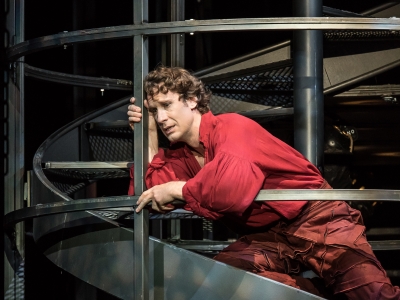

Pelléas and Mélisande Debussy
Archived: 2014/2015Overview
In the dreamlike kingdom of Allemonde, a bond forms between the fragile Mélisande and her new husband’s half-brother, Pelléas.
This is a tragic opera unlike any other, Debussy eschews vocal fireworks to create a strange, dreamlike atmosphere which is hard to escape from. It is fitting that the team who created a definitive account of Lulu in 2013 should return to stage this beautiful and troubling 20th century masterpiece.
Prepare to lose yourself in Debussy’s sensual and mysterious world.
Supported by WNO Partners.
Supported by WNO Pelléas Circle.
The Times




Synopsis
Act One
While out hunting in the ancient forests of Allemonde, Golaud, widower and grandson of the aged King Arkel, loses his way, and stumbles across a frightened and mysterious girl sitting by a pool. Deep in the water there is a crown, but the enigmatic Mélisande refuses to allow Golaud to try and retrieve it for her, despite her distress. He persuades her to come with him, and leave the forest behind.
Months later, in the royal palace, Geneviève, Golaud’s mother reads aloud a letter from her son. Golaud writes that he has married Mélisande, and swears he will sail away forever if the king disapproves of his bride, whose identity still remains a mystery. The King forgives Golaud, and charges Pelléas, his other grandson - Golaud’s half-brother - with relating the news of his approval. Pelléas asks to be allowed to bid farewell to a dying friend, but the King reminds him of his duty: Pelléas must await his brother’s return, attend to his ailing father, and greet Golaud’s bride, Mélisande. At Geneviève’s bidding, Pelléas takes Mélisande into his care, and together they watch the departure of a ship.
Act Two
Deep in the park, they come across a well, and as Mélisande is playing with her wedding ring, she accidentally drops it into the water. Simultaneously, deep in the forest, Golaud is struck by a sensation of great loss, and his horse bolts. Mélisande tends him in his weakness, but she begins to weep, explaining that she longs to escape the castle. Golaud notices that her wedding ring is missing, and he sends Pelléas and Mélisande away to find it in the grotto where she has falsely said she lost it to avoid arousing suspicion. Mélisande is terrified by the sinister, moonlit grotto, which is full of sleeping beggars, and she begs to be taken away.
Act Three
Pelléas comes to the tower to bid farewell to Mélisande, but he is entranced by her long, flowing hair, and kisses it. Golaud reprimands them for behaving like children, and leaves with his half-brother, taking him to a gloomy and oppressive vault. When they emerge, he warns Pelléas that Mélisande is expecting a child.
Pelléas and Mélisande meet in the castle alone, and Golaud is devoured by his jealousy. He makes his little son from his first marriage, Yniold, observe the couple, and even though the frightened boy reports nothing improper, Golaud is still suspicious.
Act Four
Pelléas resolves to leave the castle, and arranges to meet Mélisande one last time at the well where she lost her ring. King Arkel tries to reassure Mélisande that the castle will be happier once Pelléas’ father recovers from his illness. He is mortified when Golaud accuses Mélisande of infidelity, and throws her to the floor. She weeps in her sorrow, and Arkel is full of pity for her.
By the well, little Yniold is trying to find a ball he has lost, when he is distracted by the sight of sheep being led to the slaughter, and wanders off. Pelléas and Mélisande meet there once again, and quietly declare their love, unaware that Golaud is spying on them. The enraged husband kills Pelléas, and chases the pregnant Mélisande.
Mélisande now lies dying, having prematurely given birth. Golaud is full of remorse, but despite Mélisande’s suffering, he demands to know whether she was unfaithful to him. She maintains her innocence and dies, as Arkel leads the grieving Golaud away.



